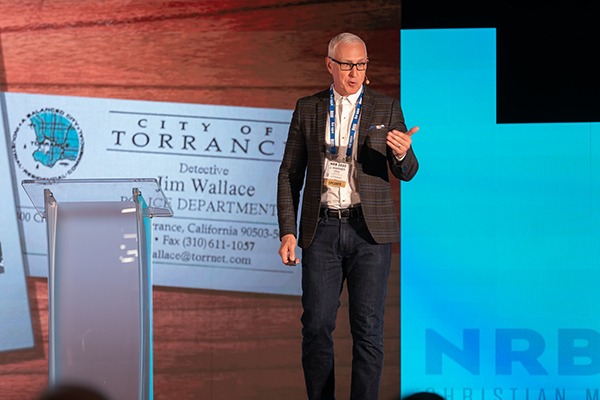Retired Los Angeles homicide detective J. Warner Wallace says Christians need to be more strategic and passionate and maintain the proper perspective in sharing their faith.
Wallace’s investigative expertise has earned him numerous appearances on NBC’s Dateline, Court TV, Fox News and the nickname “evidence whisperer.” The same way a detective approaches a case, he said, is the same way Christians should approach their faith and how they share it with others.
“That same approach I take with cold cases, I’ll use also with working the case for Christianity. That’s how I became a Christian.” he told a workshop group during the National Religious Broadcasters convention in Nashville in February. His workshop focused on practical ways to share the gospel in today’s culture.
Once a devout atheist, today Wallace is a speaker, writer, and teacher of apologetics who focuses on how Christians can be more effective in sharing their faith in a skeptical world. He is the author of “Cold-Case Christianity” and “Forensic Faith.”
Wallace, who didn’t come to faith until he was 35, said he needed to be convinced of why he should put his trust in the Bible.
“I didn’t trust your Bible,” he told the group. “I needed to know why I should trust your Bible first.”
Convincing and passionate communication, he noted, is an important part of sharing the truth of the gospel.
“Gen Z and Millennials are walking away from the church in the fastest way possible,” he said. “And I think we have to change the way we communicate the claims of Christianity to a generation that has got multiple claims being made on digital media.”
Preparation, the same preparation that would go into an investigation or selecting a jury, is also important.
“It turns out preparation is directly connected to your level of excitement,” he said.
Wallace said most people wouldn’t be interested if he offered to take them somewhere to share their faith with strangers.
“Most of you would find a way out of it,” he said. “Why? Because you don’t feel prepared, and you lack the excitement to do this.”
‘First 10 seconds’
Wallace has a friend who starts evangelism conversations with the question, “What do you think happens when you die?” And working up enough courage to ask a question like that is the hardest part, he said.
“It turns out what you’re afraid of is the first 30 seconds,” he said. “Because trust me, after [someone] answers this question, it’s easy. Now you’re in conversation and we all know how to do that. What we’re afraid of is how to start it.”
His advice? Figure out what you’re going to say and then follow through.
“If you want to share the gospel more often, think about your first 10 seconds. Memorize it, painfully get it out.
It’s all downhill from there. It’s easy after that,” he said.
He compares evangelism to a game of baseball, not tennis.
“Sometimes all I’m doing is trying to move a person from first base to second, that’s it,” he said. “If I do that, that’s good.”
Ultimately the goal is to get someone to home plate or a decision for Christ, but that may mean only starting out with a base hit, he said.
“I would only fail if I don’t even get up to swing,” he said. “If you start looking at it that way, it will change your expectation levels. … You’re a part of a team and everybody’s journey.”
For more information about Wallace, visit ColdCaseChristianity.com.






Share with others: